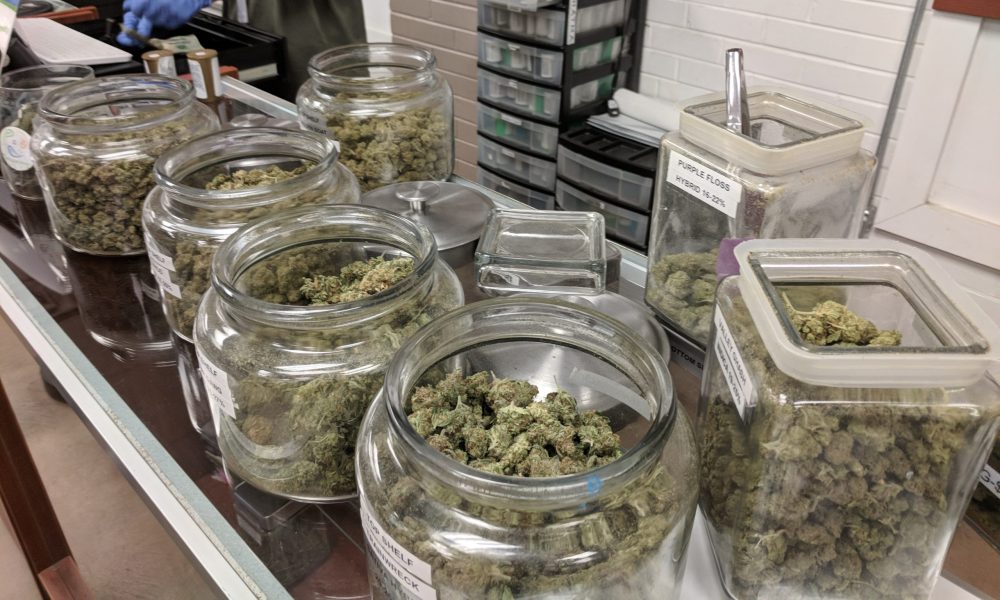The third-highest-ranking Senate Democrat visited a credit union on the unofficial marijuana holiday 4/20 on Wednesday, reiterating her support for passing a bipartisan cannabis banking reform bill and explaining how she’ll fight to get the policy change enacted sooner rather than later.
Sen. Patty Murray (D-WA) discussed the issue and her commitment to resolving the problem at a press event at a branch of the Salal Credit Union. The assistant Democratic Senate leader was also recently appointed as a conferee on a large-scale manufacturing bill where the cannabis banking proposal is expected to be considered as Congress finalizes the legislation to be sent to President Joe Biden.
The broad legislative vehicle may be the “best opportunity” that lawmakers have to advance marijuana banking reform this session, the senator said, adding that it’s among her “top priorities” as lawmakers move to conference. The America COMPETES Act “has a really good chance of passing and deals with a lot of really critical issues facing Americans today,” she said.
“I feel good about that path,” Murray said. Despite the challenges, the senator said that “this is one way that I do believe we can get it done.”
“There is [marijuana legalization] legislation in the Senate that is much broader that covers many different issues regarding the cannabis industry—which I think is very important—but the fact is that it’s going to take a long time to convince people to get it through both houses. We need to deal with this issue in terms of banking and safety right now. That’s the argument we are making.”
“We’re here today because law-abiding small businesses are being forced to conduct business solely in cash, making them a huge target for crime—and all because the federal laws on cannabis have not caught up with us here in Washington State,” Murray said. “This is really dangerous for small business owners and workers who are just following the letter of the law.”
Federal laws on cannabis haven’t caught up with Washington state & it’s hurting small businesses and putting workers in danger. We’ve got to pass the #SAFEBankingAct because it makes absolutely no sense that legal cannabis businesses are being forced to operate entirely in cash.
— Senator Patty Murray (@PattyMurray) April 20, 2022
Wednesday’s developments also come as Washington State officials step up their efforts to support marijuana businesses amid a spike in crime targeting the largely cash-based industry.
“It makes absolutely no sense that legal businesses are being forced to operate entirely in cash, and it’s dangerous—and sometime even fatal—for employees behind the register,” Murray said. “But this situation is also completely reversible. I’ve been pushing the federal government, particularly my Republican colleagues, to catch up with us here in Washington State. I am working to update our laws.”
Today I joined @WATreasurer & local cannabis store owners in Tukwila to talk about the #SAFEBankingAct.
Right now, law-abiding cannabis stores are wrongly forced to only accept cash, & that’s dangerous. I know there’s bipartisan support to pass this & I’m working to get it done. pic.twitter.com/FYp5MC8f64
— Senator Patty Murray (@PattyMurray) April 20, 2022
The senator said that she believes that Congress can “make 2022 the year that we send [cannabis banking reform] to the president’s desk,” even as lawmakers continue to push for broader legalization legislation.
Meanwhile, with burglaries and robberies on the rise at licensed cannabis retailers, Washington Gov. Jay Inslee (D) and other officials have convened a meeting with marijuana stakeholders and financial institutions to “discuss cash-less options for store operations,” the state Liquor and Cannabis Board (LCB) said in a notice on Tuesday.
LCB announced that the state Department of Financial Institutions (DFI) has launched a web page that lists third-party businesses that provide cashless services that could help mitigate the unique public safety risks that marijuana companies face.
Retail Safety Update from LCB Chair David Postman https://t.co/60qjVKYo89
— WA Liquor & Cannabis Board (@WSLCB) April 19, 2022
“While retailers want to reduce their reliance on cash transactions, options are limited while cannabis remains a Schedule 1 Controlled Substance and the federal government does not act to allow banking for cannabis transactions,” LCB said after the web page launched. “However, there are cashless options available that some retailers are currently using. This message is intended to clarify that certain cashless transactions are allowed.”
Inslee, State Treasurer Mike Pellicciotti and others will separately be sending a letter to Congress to reiterate their call for a federal fix to the state-federal policy conflict on cannabis banking issues, LCB said.
WA Treasurer Pellicciotti joined U.S. Senator @PattyMurray and local cannabis business owner Shea Hynes at Salal Credit Union in Tukwila in support congress passing the #SAFEBankingAct, which would allow legal #cannabis businesses equitable access to banking services.
— WA State Treasurer (@WaTreasurer) April 20, 2022
The letter is meant to coincide with an op-ed published by the governor and state attorney general this week outlining problems with the status quo and urging congressional action.
Our cannabis businesses and workers need Congress to act now and pass the SAFE Banking Act. More access to common cashless payments is an urgent matter of life and safety. @AGOWA https://t.co/sK4ZcJkxDj
— Governor Jay Inslee (@GovInslee) April 20, 2022
“Congress must take action immediately to pass the SAFE Banking Act, which would, at long last, allow cannabis retailers to more easily use common cashless payment options such as credit and debit cards. This policy is years overdue,” Inslee and Attorney General Bob Ferguson (D) wrote.
We must protect cannabis workers and retailers and pass the #SAFEBankingAct — now. Proud to partner with @JayInslee on this op-ed. https://t.co/wzdmGuTaxZ
— Bob Ferguson (@BobFergusonAG) April 20, 2022
“Every day of delay means business owners are incurring extraordinary costs to hire their own armed security. Retail store employees are being traumatized, assaulted and even killed,” the two officials wrote. “Even for those of us who want to accelerate national comprehensive reform and legalization, it is hard to understand how not voting on the SAFE Banking Act helps achieve that goal.”
Meanwhile, LCB said that a “small group of agency and governor’s office staff will be convening to discuss possible legislation to help licensees.” One option on the table would be to provide tax relief at the state level to marijuana licensees that “make safety improvements to operations.”
These developments come weeks after LCB held a roundtable event with marijuana retailers, industry advocates, state lawmakers and the treasurer.
“A key message from retailers at the March 29 Roundtable was for the state to ‘not wait to act until our plans are perfect,’” LCB Chairman David Postman said. “We have taken that to heart and have been working hard to take action on solutions available to us.”
For example, a board representative held an online session with marijuana licensees and law enforcement last week to talk about “best practices for safe operations in light of the crime surge.”
LCB is also exploring the possibility of issuing contracts “for in-person crime prevention training,” the notice says.
Meanwhile, Postman mentioned in the notice that state regulators continue to focus their attention on getting a federal policy fix enacted to provide protections to financial institutions that service state-legal marijuana businesses.
As part of that effort, the chairman recently met with staffers for Murray to discuss the SAFE Banking Act, which has passed the U.S. House of Representatives six times in some form at this point.
“As you may know, the concern is that Senate sponsors of a national legalization bill are reluctant to pass SAFE without the bigger bill,” the regulator said. “They say they don’t want to continue to advance the current cannabis industries around the country before national legislation is in place with criminal justice reform and a mandate for a more equitable system.”
Washington State officials also recently held a virtual roundtable to address the recent spate of deadly robberies targeting marijuana retailers, with regulators reiterating their call for a federal policy change and discussing steps the state can take on its own while Congress fails to act.
The reluctance from the Senate to pass the SAFE Banking Act prior to enacting comprehensive legalization was also the subject of a letter from the bill’s sponsor, Rep. Ed Perlmutter (D-CO), that was sent to Senate leadership on Tuesday.
👇 Yes, exactly!
Thank you @PattyMurray for your support of #SAFEBanking. We need this legislation to protect our communities and businesses and their employees. https://t.co/QHhrFxSKAr
— Rep. Ed Perlmutter (@RepPerlmutter) April 20, 2022
“The issue is part of the America COMPETES Act, an unrelated economic development and trade bill. That House passed COMPETES with SAFE in it but the Senate stripped everything from the Act, forcing it to a conference committee,” Postman said. “Senators Murray and [Sen. Maria Cantwell (D-WA)] and [Rep. Suzan DelBene (D-WA)] are conferees and the governor and others will be reaching out to them to discuss the need to act now.”
Murray said on Wednesday that, as an appointed conferree on the legislation, one of her “top priorities in this negotiation is making sure that this bill will include the SAFE Banking Act.”
“That’s why I believe we can get this done,” the senator said. “We can pass this and ensure that all legal cannabis businesses here in Washington State have access to the financial services they need to conduct businesses just like everyone else and, importantly, keep our workers safe.”
Adding pressure to pass the marijuana banking bill as part of America COMPETES is the fact that Senate Majority Leader Chuck Schumer (D-NY) said last week that the timeline for the introduction of his legalization bill has been pushed back, despite saying previously that it would be formally filed this month.
Back at the state-level in Washington, the LCB chairman also said that staff “met with Labor & Industries to discuss worker safety regulations and the role of L&I as it pertains to workplace safety,” adding that there are “things happening in that realm and we expect L&I to be communicating with the industry as a whole about expectations.”
As Congress continues to stall on marijuana banking reform, more state officials and lawmakers are taking steps on their own to resolve the issue, especially in light of the targeted crime surge.
Pellicciotti, Washington State’s treasurer, has also been especially vocal about the need for congressional reform, and he wrote in a recent letter to his colleagues in other states that it’s “just not safe to have this financial volume in cash.”
He made similar remarks at a recent conference of the National Association of State Treasurers (NAST). And Colorado Treasurer Dave Young echoed that sentiment in a recent interview with Marijuana Moment.
The Pennsylvania Senate separately approved a bill last week to safeguard banks and insurers against being penalized by state regulators for working with state-legal medical marijuana businesses.
Perlmutter, for his part, has even made a point to talk about enacting the reform legislation during committee hearings on ostensibly unrelated or wider-ranging legislation, like at a recent House Rules Committee hearing.
At a recent event hosted by the American Bankers Association (ABA), the congressman said that he will “continue to be a real pest, and persistent in getting this done” before he leaves Congress.
Despite recently saying that he’s “confident” that the Senate will take up his bill this session, the congressman recognized that while he’s supportive of revisions related to criminal justice reform, taxation, research and other issues, he knows that “as we expand this thing, then we start losing votes, particularly Republican votes and we got enough votes in the Senate to do it” as is.
Ahead of last month’s ABA event, the financial group released a poll that it commissioned showing that a strong majority of Americans support freeing up banks to work with marijuana businesses without facing federal penalties.
Meanwhile, the number of banks that report working with marijuana businesses ticked up again near the end of 2021, according to recently released federal data.
It’s not clear if the increase is related to congressional moves to pass a bipartisan cannabis banking reform bill, but the figures from the Financial Crimes Enforcement Network (FinCEN) signal that financial institutions continue to feel more comfortable servicing businesses in state-legal markets.
Some Republicans are scratching their heads about how Democrats have so far failed to pass the modest banking reform with majorities in both chambers and control of the White House, too. For example, Rep. Rand Paul (R-KY) criticized his Democratic colleagues over the issue in December.
White House Touts Marijuana Research Amid Inaction To Free Prisoners When Pressed On 4/20
Medical Disclaimer:
The information provided in these blog posts is intended for general informational and educational purposes only. It is not a substitute for professional medical advice, diagnosis, or treatment. Always seek the advice of your physician or other qualified healthcare provider with any questions you may have regarding a medical condition. The use of any information provided in these blog posts is solely at your own risk. The authors and the website do not recommend or endorse any specific products, treatments, or procedures mentioned. Reliance on any information in these blog posts is solely at your own discretion.







